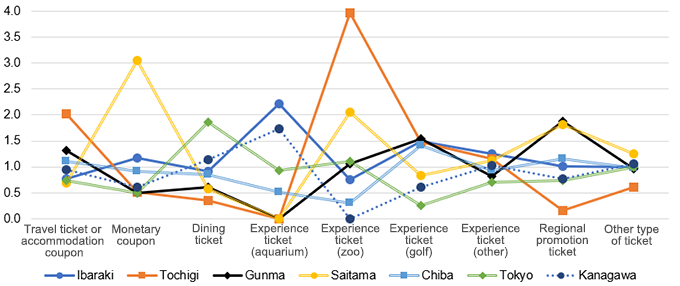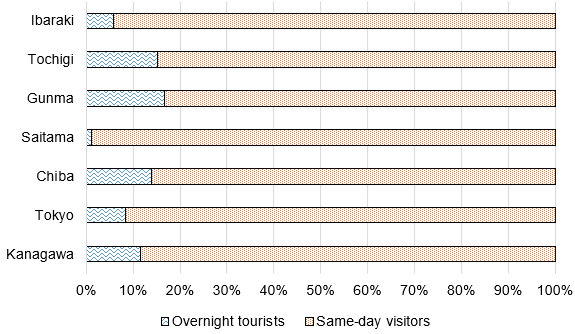Introduction
The Hometown Tax System, which was launched in 2008, has seen wide use thanks to the improvements in return gifts, raising the deduction upper limit, and simplification of procedures through the introduction of one-stop applications. In FY2023, 10 million people used the system and 1 trillion yen in taxes were paid (Ministry of Internal Affairs and Communications, 2024).
When people hear the term return gifts for hometown tax donations, many people likely imagine receiving meat, seafood or marine products, or rice in particular recently. However, the types of return gifts are not limited to local specialties like food products. According to the questionnaire survey conducted by INTAGE Research Inc. targeting users of the Hometown Tax System in 2024, "travel or experience ticket" (2.5%) and "gift card, monetary coupon, or complimentary ticket" (2.2%) to be used within recipient municipalities were also selected as return gifts, although the percentages were much lower than those for "seafood or marine products" (40.6%), "meat" (38.7%), and "rice" (31.0%) (Konishi et al. 2025).
Such travel and gift coupons often incur other expenses as recipients visit the region and spend on eating and drinking, shopping, activities and accommodations. Therefore, the economic ripple effects of these coupons are larger than when people purchase local specialties for delivery.
Furthermore, the travel or gift coupons could trigger exchanges between those tourist donators and local residents, shifting such tourists from a nonresident population to a population with close connections to the municipalities (connected populations). It has been confirmed that municipalities that provide experience-based programs as return gifts have built a lasting relationship between local companies and donators through mutual exchanges (Ashizawa et al., 2020). The questionnaire survey conducted by Redhorse Corporation also shows that 90% of users of such experience-based return gifts answered that they wished to visit the recipient municipalities again (Redhorse Corporation, 2023).
With this background, I examined the prospects for regional revitalization through the use of experience-based return gifts for hometown tax donations, focusing on exchanges with urban residents, based on the situation in the Kanto District.
The Status of experience-based return gifts
First, I verified the number of return gifts, "travel ticket or gift card," provided to donators based on the data available on the website "Hometown Tax Donation Guide" (https://furu-sato.com/) (available in Japanese), which enables comparisons among various hometown tax donation intermediary websites (Table 1).
Calculated by item, excluding “other tickets,” the most common items were "travel ticket or accommodation coupon," followed by "dining ticket," "experience ticket (other)." By prefecture, Kanagawa had the largest total number of return gifts provided, followed by Chiba and Tokyo. While Ibaraki receives the largest amount of hometown tax donations, the total number of return gifts provided for Ibaraki was smaller than that for Tokyo. Prefectures including Tokyo in the southern part of the Kanto District, which has fewer options for food-based specialties as return gifts, seem to offer and provide more experience-based return gifts.

[Click to enlarge]
Differences in items by region
Next, I examined the differences in items provided as return gifts by prefecture in terms of the specialization index (an index which shows how many times larger the composition ratio for each prefecture is than the composition ratio based on the Kanto District as a whole for each item; if the value is 1 or more, this means that a prefecture is superior to the others for the relevant item) (Figure 1).
By item, the specialization index was high for the following items: the index for "travel ticket or accommodation coupon" was 2.02 for Tochigi and 1.31 for Gunma, that for "monetary coupon" was 3.05 for Saitama, that for "dining ticket" was 1.87 for Tokyo and 1.14 for Kanagawa, that for "experience ticket (golf ticket)" was 1.54 for Gunma, 1.50 for Ibaraki, and 1.47 for Tochigi, that for "experience ticket (other)" was 1.25 for Ibaraki and 1.16 for Tochigi, that for "regional promotion ticket" was 1.88 for Gunma and 1.81 for Saitama, and that for "other type of ticket" was 1.25 for Saitama.

[Click to enlarge]
Differences in the specialization coefficients by item reflect the number of tourists from each prefecture.
When looking at the percentages of overnight stays and same-day visitors in 2018 (prior to the outbreak of COVID-19), for which comparative data are available, the percentage of overnight stays was high for Gunma (16.7%), followed by Tochigi (15.2%) and Chiba (13.9%). The relevant percentage was below 10% for Tokyo (8.4%), Ibaraki (5.8%), and Saitama (1.1%) (Figure 2).
Gunma and Tochigi, which have high percentages of overnight stays, offer both an "experience ticket (other)" and "regional promotion ticket" that can be used for activities in relevant municipalities, in addition to a "travel ticket or accommodation coupon," as their efforts to increase overnight stays. On the other hand, Saitama and Tokyo, which have high percentages of same-day visitors, intend to attract same-day visitors by offering "monetary coupons," "dining tickets," and "regional promotion tickets." When preparing experience-based return gifts, it is important to consider the needs and preferences of people that individual municipalities want to attract.

Differences in targets by region
Additionally, are there any regional differences in targets for experience-based return gifts?
Out of experience-based return tickets categorized into "experience ticket (other)," opportunities to enjoy water sports, agricultural experiences, culture experiences, facility tours, etc. are provided at many places.
Regarding water sports, canoeing, paddle surfing, rafting, diving, and surfing can be experienced, and regarding agricultural experiences, harvesting of strawberries and blueberries is popular, in addition to farming experiences. The quality of these types of experiences is dependent on natural environments, and instructors/guides. On the other hand, the quality of cultural experiences and facility tours, etc. varies depending on the targets and instructors/guides.
As for cultural experiences, quite a few return gifts enable donors to experience local culture, such as ceramic art (Kasama City, Ibaraki), Japanese tea garden visits and the art of tea ceremony (Koga City, Ibaraki), Edo-komon-zome (dyeing) and Edo-kiriko (cut glass) (Sumida Ward, Tokyo), and geisha performances (Hakone Town, Kanagawa). There are also experience programs that take advantage of skilled locals, such as coffee blending (Choshi City, Chiba), hand knitting (Hachioji City, Tokyo), magic classes (Sagamihara City, Kanagawa), and natural fragrance blending (Kamakura City, Kanagawa).
Regarding facility tours, etc., many tours are offered in cooperation with distinctive private companies, such as winery visits (Ashikaga City, Tochigi), live radio appearances (Kumagaya City, Saitama), train charters (Choshi City, Chiba), smart city visits (Fujisawa City, Kanagawa), and fireworks viewing (Shimonita Town, Gunma; Adachi Ward, Tokyo; Fuchu City, Tokyo; and Zushi City, Kanagawa).
Cultural experiences and facility tours have room for differentiation and are easily conducted in urban areas. Close collaboration between municipalities, local private companies and residents can also enhance these activities.
Conclusion
We have examined the possibility of regional revitalization through experience-based return gifts for hometown tax donations, mainly focusing on the Kanto District, based on information available on the website "Hometown Tax Donation Guide."
The key to successful experience-based return gifts is not only local natural and cultural resources, but also to the utilization of local private companies and human resources. By highlighting local private companies and human resources, municipalities can expand and improve their return gifts through originality and ingenuity, outside of locational constraints. According to a survey targeting all local governments (all municipalities in all prefectures) conducted by the Cabinet Secretariat, out of 1,407 local governments that made efforts “to create and expand the connected population” in FY2023, 554 local governments (39.4%) made efforts to increasingly connect hometown tax donators to their respective gift areas and to transform them into connected populations (Cabinet Secretariat, 2024). They are distributing email magazines, sending direct mail, and holding exchange events, etc. for that purpose.
It is hoped that local governments, local private companies and residents will cooperate closely to develop experience-based return gifts by making full use of local attractions, while benefiting from cooperation of experts as necessary, and to further promote information provision and exchange with donators, leading to donator visits, interaction with local people, expanding economic ripple effects and connected populations, and migration of people to the areas.
May 15, 2025
>> Original text in Japanese


